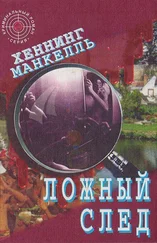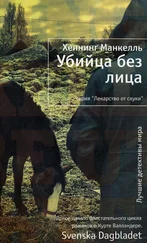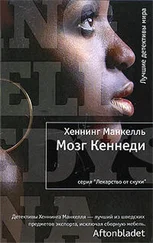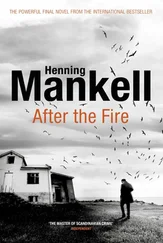“No, the surveillance has been canceled.”
“Who the hell made that call?”
“Viktorsson thought it was a waste of our resources.”
“Well, I want a car reposted there immediately. I canceled the surveillance of Apelbergsgatan, which maybe was a mistake. I think I want a car there, too, from now on.”
Martinsson left the room, and Wallander knew he would see to it that the patrol cars were dispatched immediately.
They waited in silence for his return. Höglund offered Nyberg, who was still combing his hair, her make-up mirror so he could see what he was doing but he simply growled at her. Martinsson came back.
“Done.”
“What we’re looking for is the catalyst,” Wallander said. “It could be something as simple as Falk’s death. At least that’s how I see it. As long as he was alive, everything was in control. But then he died, and everything threatened to unravel.”
Höglund raised her hand.
“Do we know for sure that Falk died from natural causes?”
“I think it must have been natural causes. My conclusion is based on the fact that Falk’s death was unexpected. Falk was in excellent health. But he died, and that’s what started the chain reaction. If Falk had continued to live, Sonja Hökberg would have been tried and convicted of Lundberg’s death. Neither she nor Jonas Landahl would have been killed. Landahl would have kept running errands for Falk. And we would have had no idea of whatever it is that Falk and his companions were planning.”
“So it’s only thanks to his death that we know something is going to happen, something that might affect the whole world?”
“That’s how I see it, yes. If someone else has a better hypothesis, I’d like to hear it.”
No one had anything to say.
Alfredsson took out his briefcase and poured out a number of loose papers, some torn, some folded in half.
“These are Modin’s notes,” he said. “They were lying in a corner and I gathered them up. Do you think it’s worth our time to go through them?”
“That will be up to you and Martinsson,” Wallander said. “You are the only two who will understand what he’s talking about.”
The phone rang and Höglund answered. She handed the receiver to Wallander, saying it was Hansson.
“A neighbor claims she heard a car drive away with squealing tires at about nine-thirty,” he said. “But that’s all we have been able to establish. No one seems to have seen or heard anything else. Not even the shots.”
“There was more than one?”
“The doctor says she was shot twice in the neck. There are two entry wounds.”
Wallander felt sick to his stomach. He forced himself to swallow hard.
“Are you still there?”
“I’m here. No one heard the shots?”
“At least not the immediate neighbors, and they’re the only ones we’ve had time to wake up so far.”
“Who is leading the work down there?”
“A guy named Forsman. I’ve never met him before.”
Wallander couldn’t recall hearing the name, either.
“What does he say?”
“He says he has trouble getting a coherent picture from what I tell him. There’s no motive, for a start.”
“You’ll have to placate him the best you can. We don’t have time to fill him in right now.”
“There was one more thing,” Hansson said. “Didn’t Modin say he was on his way down here to pick up some diskettes?”
“That was what he said.”
“I think I know what room he was staying in, but there are no diskettes in there.”
“He must have taken them with him. Have you found anything else that belongs to him?”
“Nothing.”
“Any signs that anyone else was in the house?”
“A neighbor claims a taxi came by earlier in the day. A man stepped out of it.”
“That could be important. Try to find that taxi. Make sure Forsman makes that a priority.”
“You know I have no control over what police from another district choose to do or not.”
“Then you’ll have to do this yourself. Did the neighbor give a description of the man?”
“All he said was that the man looked lightly dressed for this time of year.”
“He said that?”
“Yes, I think so.”
It’s the man from Luanda. , Wallander thought. The one whose name starts with “C. ”
“This business with the taxi is very important,” Wallander repeated.
“It probably came from one of the ferry terminals, or Sturup International Airport.”
“I’ll see what I can do.”
Wallander told the others about their conversation.
“I think the reinforcements have arrived,” Wallander said. “Maybe even from as far away as Angola.”
“I haven’t been able to get a single answer to any of my inquiries,” Martinsson said. “I’ve been researching known sabotage and terrorist groups that focus on financial targets. But no one seems to have any data on them.”
“You think people like that would be based here in Ystad?”
Nyberg put his comb down and stared disapprovingly at Wallander, who thought that Nyberg suddenly seemed very old. Did the others see Wallander himself in this way?
“A man of Asian heritage turns up dead in a field outside Sandhammaren,” Wallander answered. “He was posing as a man from Hong Kong and we know this identity was forged. This is not the kind of thing that should happen around here. But it does. There are no truly remote parts of the world anymore. If I understand anything about the new technology it is that it enables you to be at the center of things from any geographic location.”
The phone rang again. Wallander answered again. It was Hansson. “Forsman is actually pretty good,” he said. “Things are moving right along. He’s found the taxi.”
“Where did it come from?”
“Sturup. You were right.”
“Has anyone spoken to the driver?”
“He’s right here. His shifts seem to be very long. Forsman says hello, by the way. Apparently you met at a conference last spring.”
“Then give him my regards as well,” Wallander said. “Let me talk to this driver.”
“His name is Stig Lunne. Here he is.”
Wallander gestured to the others to hand him a piece of paper and a pen.
The taxi driver spoke with such a thick Scanian dialect that it was almost impossible, even with Wallander’s extensive experience, to understand him. But at least his answers were impressively short and concise. Wallander told him who he was and what he wanted to know. He had picked his passenger up at two minutes past twelve from Sturup and the trip had not been booked in advance.
“Can you describe your passenger?”
“Tall.”
“Anything else?”
“Thin.”
“Is that all? Is there anything else you might have noticed?”
“Tan.”
“So this man was tall, thin, and suntanned?”
“Yes.”
“Did he speak Swedish?”
“No.”
“What language did he speak?”
“I don’t know. He showed me a piece of paper with the address.”
Wallander sighed. After continued questioning, he found out that the man had been wearing a light summer suit. He asked Lunne a few other routine questions, then finished. He thanked him and asked him to be in touch if he thought of anything else.
It was three o’clock. Wallander gave the others the description that Lunne had given him. Martinsson and Alfredsson had already left to go read through Modin’s notes. Now they returned.
“It’s hard to get anything out of Modin’s notes,” Alfredsson said.
“Not least because he writes things like ‘What we need to find is a coffee machine that’s right in front of our eyes.”’
“He’s talking about the process that triggers the intended event,” Wallander said. “We discussed that it was probably something very common, something most of us do every day without thinking twice about it. When the right button is pushed at the right time and place, then something is set in motion.”
Читать дальше












